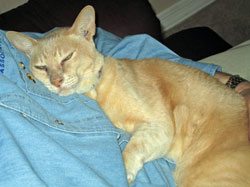What happens on Doing Nothing Day? Absolutely nothing. That’s the whole purpose of it: a day free from striving and achieving and getting and coping with everyone else’s demands. A day for yourself, when you can walk or sit and think without celebrating, observing, or honoring anything or anyone besides yourself. No working, no worrying, no planning, no socializing, no sitting slumped in front of the TV. On Doing Nothing Day, stay in the moment, holding onto nothing, striving after no thought or ambition or goal. Be who you are, without judgment, fear or concern. Slow down. Stop worrying about anything; it will all be there tomorrow, ready for you to begin fretting and obsessing over again. For today—Doing Nothing Day—spend the time with yourself. Get to know this person, the person you are. In all the rush and bustle of the world, you’ve probably become strangers. Take time out to be together, find out about one another, to become friends again. Above all, do nothing. Be like the House of Lords in Gilbert and Sullivan’s operetta, who “. . . did nothing in particular—and did it very well.” Try not to focus on getting anything done, even thinking. Take a walk. Look around. Just be. You’re alive, which is a marvel in itself, and one that won’t last for ever. Enjoy it. Every little helps . . . If you can’t manage a day, hold a Doing Nothing Morning, or even a Doing Nothing Hour. Anything will be useful. Allowing yourself to do nothing from time to time is wonderfully good for your mental health and well-being. You spend so much time thinking about what you’re going to do and trying to accomplish all the things you plan. Take a little time off. Spend it living your life, not living your ambitions, or someone else’s plans and needs, or some conventional idea you only half believe in. Rediscover the wonder of doing nothing in particular, like a child spending hours engrossed in nothing you could easily describe other than being a child and enjoying being alive. When your Doing Nothing Day is over, I think you’ll return to your usual activities refreshed, renewed, and a tad more alive than before. I’ll also be surprised if you don’t return with some surprising insights. Try it. You have nothing to lose. Adrian Savage is a writer, an Englishman, and a retired business executive, in that order, who now lives in Tucson, Arizona. You can read his other articles at Slow Leadership, the site for everyone who wants to build a civilized place to work and bring back the taste, zest and satisfaction to leadership and life, and its companion site Slower Living. His recent articles on similar topics include lRight Attention and How to find all the time you need. His latest book, Slow Leadership: Civilizing The Organization, is now available at all good bookstores.
